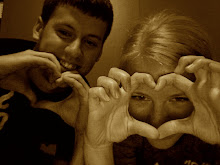There is a burden that comes with your voice in the public sphere, even if it is only on a blog. And so I thought to myself, well, why am I doing this? Why don't I just write in a private journal and keep those thoughts to myself? I'm sure my readership wouldn't be too lost without me.
Then, I was rereading sections of Bittersweet by Shauna Niequist, and ran across this section. I read,
"This is what I want you to do: tell your story. Don't allow the story of God, the sacred, transforming story of what God does in a human heart to become flat and lifeless. If we choose silence, if we allow the gospel to be told only on Sundays, only in sanctuaries, only by approved and educated professionals, that life-changing story will lose its ability to change lives."
I'm not pretending that I am not a religion major about to graduate with my degree. I won't pretend that I haven't considered going to seminary and love doing some "light" theological and academic reading. But at the same time, I refuse to pretend that I am an expert on anything. The only thing I know is my experience, my life, and how I see that fitting into what I understand to be God's story. At the end of the day, I have a responsibility to tell my story and how God works in the dark, dusty corners of my life. I am the only one that can do that, so whether I have three people listening to me or three thousand, I will continue to speak to a world that desperately needs to hear.

